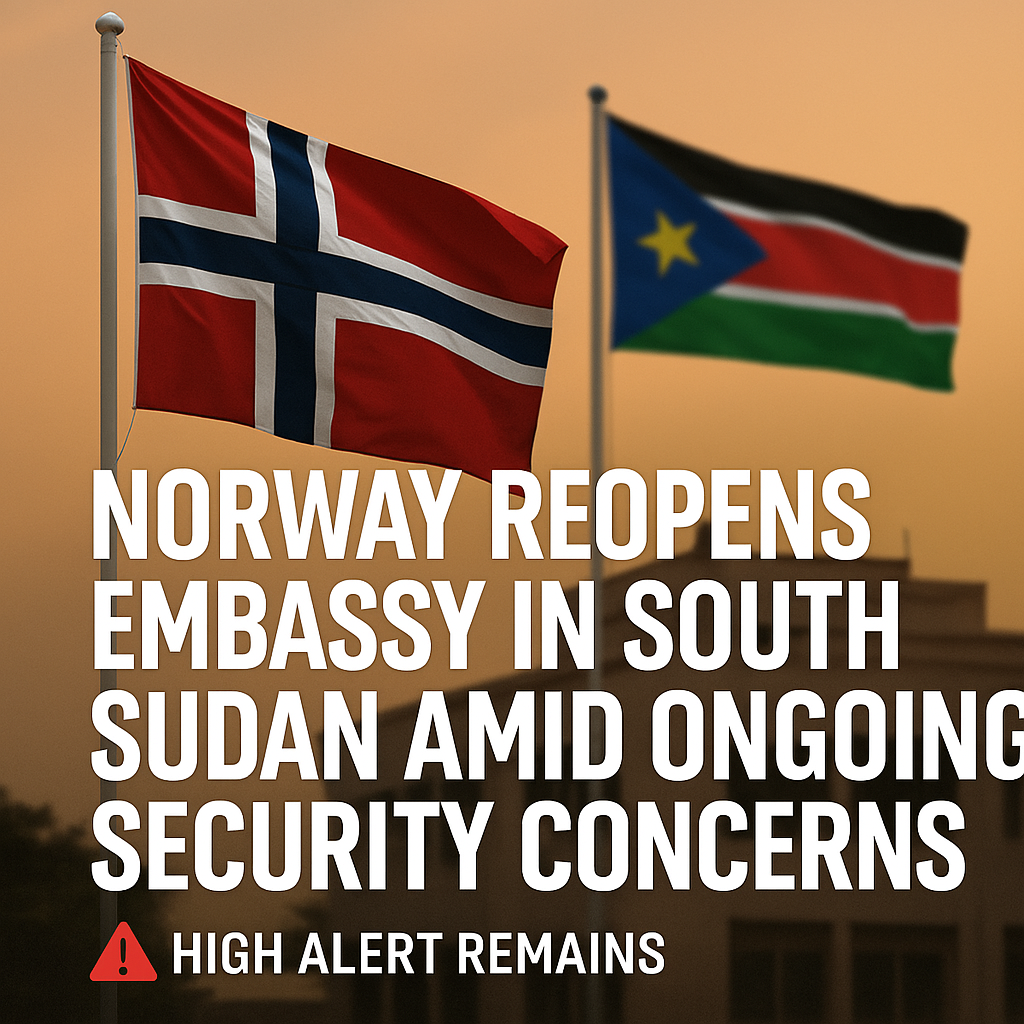
Norway. Embassy Reopens in South Sudan Amid Ongoing Security Concerns
Norway has reopened its embassy in South Sudan’s capital, Juba, following a nearly two-week closure due to escalating security risks. The decision, announced by the Norwegian Ministry of Foreign Affairs, brings cautious optimism but no reason for full relief yet. While the embassy is operational again as of April 8, 2025, the travel advisory for South Sudan remains at its highest alert level.
For Norwegians, this means one clear thing: stay away, and if you’re already there — leave as soon as possible.
Key Takeaways
-
Norway reopens its embassy in Juba, South Sudan, after temporary closure.
-
The decision follows slight improvements in local security conditions.
-
Travel advisory for South Sudan remains at the highest alert level.
-
Norwegian citizens are urged to leave South Sudan immediately.
-
Germany keeps its embassy in South Sudan closed due to security concerns.
A Tentative Step Amid Turbulence
The reopening of Norway’s embassy comes after it was shut down on March 26, 2025, when violence and instability surged in the region. Although the Norwegian government has not explicitly outlined the reasons for reopening, it is widely believed that the decision follows modest improvements in the security situation.
However, the caution is far from over. Norwegian authorities have made it crystal clear: their ability to provide consular assistance in South Sudan remains limited. The message is sobering — while the embassy is back, the risks on the ground persist.
“The Ministry of Foreign Affairs advises against all travel to South Sudan and urges Norwegian citizens to leave the country.”
— Norwegian Ministry of Foreign Affairs
Warnings Remain High
The Ministry continues to strongly discourage all travel to South Sudan. For Norwegians who find themselves in the country, the guidance is unequivocal: make plans to leave immediately. Consular services are limited, and the volatile security environment leaves little room for safety guarantees.
This cautious approach reflects a hard-learned lesson from the region’s unstable history. South Sudan remains a fragile state, teetering on the brink of renewed conflict despite peace agreements.
Germany Holds Back
While Norway has reopened its diplomatic doors, Germany remains more conservative. The German embassy in Juba, closed since March 22, 2025, is still shuttered. German officials cited severe tensions and the looming threat of civil war as reasons for their closure.
Germany’s Foreign Minister, Annalena Baerbock, has stressed that safety for embassy staff remains the top priority and underlined the responsibility of South Sudan’s authorities to ensure peace and uphold their commitments.
As of now, Germany has not indicated plans to follow Norway’s lead, keeping its embassy closed until conditions improve.
Opinion
In my view, Norway’s decision to reopen its embassy is a careful balancing act — a way to maintain diplomatic presence while acknowledging the volatile reality on the ground. It’s a signal to South Sudan and the international community that Norway is committed to engagement, but not at the cost of its citizens’ safety.
It is also a reminder of the delicate line that nations walk when dealing with fragile states: fostering dialogue while protecting lives.
Conclusion
In conclusion, while Norway’s embassy reopening in South Sudan is a positive step, it’s laced with caution. Norwegian citizens remain under strong advisories to avoid the country, and consular support is thin. The move keeps diplomatic channels open, but the message is clear — South Sudan remains a high-risk zone.
Until stability is truly restored, Norway and the international community will continue to tread carefully.
#Norway
Source – schengen.news
